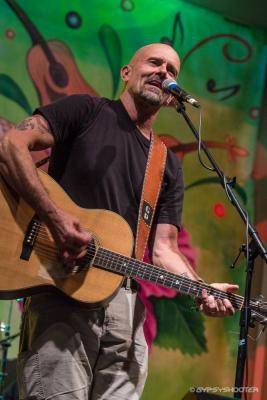Grant Peeples is Making a Scene
HOME PAGE
Making a Scene Presents an interview with Grant Peeples

A self-described “tree-hugger that watches NASCAR, and Buddhist with a gun below the seat,” Grant Peeples is known for his axe-sharp socio-political tunes, raucous humor and heart-gigging ballads.
He is the recipient of the Focus Foundation Award for Creative Excellence, which cited the “humor, compassion and wisdom of his songs,” and their “unflinching social insight and cultural acuity.” Grant tours coast to coast, and is a regular performer at The Woody Guthrie Folk Festival, the 30A Songwriters Festival, and The Florida, Folk Festival. January 2019 marked a second tour in The Netherlands, where FolkForum.nl described him “…a pure storyteller, in the best American folk tradition…” and his show “…one of those gems that you will remember for a long time…”
2020 will mark the 100th Anniversary of the ratification of the 19th Amendment, when American women wrestled their right to vote from a Constitution historically reticent to grant the equality it precisely extolled. Research shows this album might be the first effort by a male artist to record a collection of women’s songs. Though its intent was not to earn that distinction. Instead, this record, Grant’s 10th, was made in recognition of the courage and fortitude of those brave women, as well as the continuing struggle for women’s equal protections under the law.
The songwriters: Carrie Elkin, Telisha Williams, Eliza Gilkyson, Caroline Spence, Dayna Kurtz, Phoebe Bloom, Alicia McGovern, SarahMac, Rebekah Pulley, Myshkin, Ali Holder
Grant: “I unknowingly gathered these songs for years. I’ve worked with all these women in some aspect of the business; they are all friends. I heard all the songs for the first time in a live setting, where they entered me, worked me over, and never left. As I began the project, I didn’t have to go looking for songs. They had already found me. My learning and recording them was an exercise of re-discovery, a search for those original nerves the songs had struck.
A woman produced three of the records I have made. And all my records have been studded with women players. But this one, by design, has none. This is all guys trying, as it were, to carry the mail. Nor did I rewrite any story lines or change any pronouns in order to square with my gender; i.e., first line of the first song is: “When the lights are off, I need a man to touch…”
Discover more from Making A Scene!
Subscribe to get the latest posts sent to your email.






















































